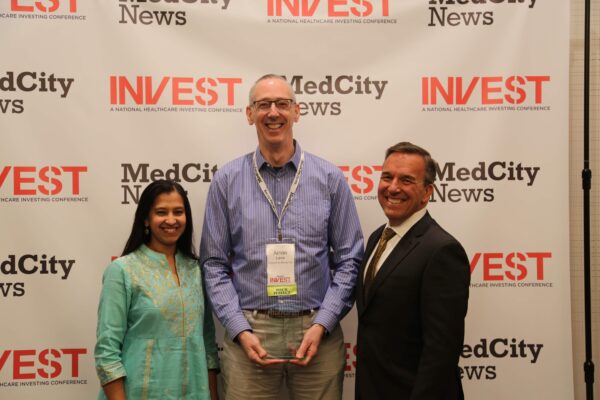
From left: MedCity News Editor in Chief Arundhati Parmar, Enzyme by Design CEO Arnon Lavie and MHIN President Dennis Depenbusch
Despite all the media attention devoted to cutting-edge therapies like CAR-Ts for pediatric acute lymphoblastic leukemia, the standard of care for early treatment of many cancers – including ALL in children and young adults – remains drugs that have been around for decades.
One of those is asparaginase, commonly used in first-line treatment of pediatric ALL for more than 50 years. While the drug usually works well – since its introduction, survival rates of children with the disease receiving the drug are nearly 90 percent, but lower for adolescents and young adults – it is also highly toxic. Allergic reactions, for example, are a common side effect. But one company, Chicago-based Enzyme by Design, is hoping to change that.

Behavioral Health, Interoperability and eConsent: Meeting the Demands of CMS Final Rule Compliance
In a webinar on April 16 at 1pm ET, Aneesh Chopra will moderate a discussion with executives from DocuSign, Velatura, and behavioral health providers on eConsent, health information exchange and compliance with the CMS Final Rule on interoperability.
Enzyme by Design, in operation since January 2017, won the Pitch Perfect contest’s pharmaceutical track at MedCity News’ INVEST conference, which took place in Chicago April 23-24.
“I heard the other talks am humbled to have been chosen,” CEO Arnon Lavie said in a phone interview.
So where did the idea of teaching an old drug new tricks come from?
While in his native Israel, Lavie was walking with his brother to an ice cream shop and talking about work. As he talked about his desire to create a humanized form of asparaginase, he explained the history of how the drug was discovered – essentially by serendipity when a scientist injected guinea pig enzyme into mice with lymphoma, causing them to go into remission.

A Deep-dive Into Specialty Pharma
A specialty drug is a class of prescription medications used to treat complex, chronic or rare medical conditions. Although this classification was originally intended to define the treatment of rare, also termed “orphan” diseases, affecting fewer than 200,000 people in the US, more recently, specialty drugs have emerged as the cornerstone of treatment for chronic and complex diseases such as cancer, autoimmune conditions, diabetes, hepatitis C, and HIV/AIDS.
Current formulations of asparaginase on the market are derived from bacteria, especially E. coli. But as Lavie explained the history to his brother, it dawned on him to also use the guinea pig enzyme as a starting point. “Sometimes when you talk to lay people, you can see the issue from a different perspective,” he said. “By taking away all the layers of complexity that we as scientists use and talking about it in a very simplistic and clear way, you can see avenues or paths that you couldn’t see because there’s so much clutter of detail.”
The guinea pig serum that was originally used is 70 percent identical to that of humans, so Enzyme by Design’s idea was to take that serum and make even more humanized, with the hope of solving the problem of allergic reactions. “Now, we have a highly humanized enzyme and are at the stage we can take it to the clinic,” Lavie said.
Another firm, France-based Erytech, has also sought to create an improved asparaginase product, by encapsulating the drug inside red blood cells. However, Lavie pointed out that Erytech’s approach still relies on E. coli-derived asparaginase, whereas what differentiates Enzyme by Design’s is the humanized nature of the product. Furthermore, all asparaginases have glutaminase activity, leading to side effects like liver toxicity and pancreatitis. However, the guinea pig enzyme has no glutaminase activity, Lavie said. With that in mind, he hopes taking away those toxicities can expand the use of asparaginase. “It’s not a like-to-have – it’s a must-have feature if you’re going to expand it into solid tumors,” he said.
The company is currently performing IND-enabling studies, a condition set by the Food and Drug Administration for entering a medicine into clinical trials, with the hope of initiating Phase I development in the first quarter of 2022. It has applied for a small business grant from the National Institutes of Health and is beginning to have discussions with investors, Lavie said. “Realistically, the IND process is complicated and expensive enough that we anticipate we would also need investor support, and that’s what brought us to MedCity.”
Photo: Getty Images












